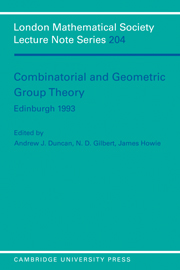Book contents
- Frontmatter
- Contents
- Foreword
- Participants
- On bounded languages and the geometry of nilpotent groups
- Finitely presented groups and the finite generation of exterior powers
- Semigroup presentations and minimal ideals
- Generalised trees and Λ-trees
- The mathematician who had little wisdom: a story and some mathematics
- Palindromic automorphisms of free groups
- A Freiheitssatz for certain one-relator amalgamated products
- Isoperimetric functions of groups and exotic cohomology
- Some embedding theorems and undecidability questions for groups
- Some results on bounded cohomology
- On perfect subgroups of one-relator groups
- Weight tests and hyperbolic groups
- A non-residually finite, relatively finitely presented group in the variety N2A
- Hierarchical decompositions, generalized Tate cohomology, and groups of type (FP)∞
- Tree-lattices and lattices in Lie groups
- Generalisations of Fibonacci numbers, groups and manifolds
- Knotted surfaces in the 4-sphere with no minimal Seifert manifolds
- The higher geometric invariants of modules over Noetherian group rings
- On calculation of width in free groups
- Hilbert modular groups and isoperimetric inequalities
- On systems of equations in free groups
- Cogrowth and essentiality in groups and algebras
- Regular geodesic languages for 2-step nilpotent groups
- Finding indivisible Nielsen paths for a train track map
- More on Burnside's problem
- Problem Session
Regular geodesic languages for 2-step nilpotent groups
Published online by Cambridge University Press: 05 April 2013
- Frontmatter
- Contents
- Foreword
- Participants
- On bounded languages and the geometry of nilpotent groups
- Finitely presented groups and the finite generation of exterior powers
- Semigroup presentations and minimal ideals
- Generalised trees and Λ-trees
- The mathematician who had little wisdom: a story and some mathematics
- Palindromic automorphisms of free groups
- A Freiheitssatz for certain one-relator amalgamated products
- Isoperimetric functions of groups and exotic cohomology
- Some embedding theorems and undecidability questions for groups
- Some results on bounded cohomology
- On perfect subgroups of one-relator groups
- Weight tests and hyperbolic groups
- A non-residually finite, relatively finitely presented group in the variety N2A
- Hierarchical decompositions, generalized Tate cohomology, and groups of type (FP)∞
- Tree-lattices and lattices in Lie groups
- Generalisations of Fibonacci numbers, groups and manifolds
- Knotted surfaces in the 4-sphere with no minimal Seifert manifolds
- The higher geometric invariants of modules over Noetherian group rings
- On calculation of width in free groups
- Hilbert modular groups and isoperimetric inequalities
- On systems of equations in free groups
- Cogrowth and essentiality in groups and algebras
- Regular geodesic languages for 2-step nilpotent groups
- Finding indivisible Nielsen paths for a train track map
- More on Burnside's problem
- Problem Session
Summary
Introduction
One possibility to show that a group G with finite semigroup generating system S has rational growth series is to exhibit a regular language L ⊆ S* consisting of geodesic words and mapped bijectively onto G. Machi and Schupp have even conjectured that the existence of such an L is equivalent to the rationality of the growth series ([2], conjecture 8.7).
The aim of this paper is to show that this approach does not work for nilpotent groups. More precisely, we show that if G is 2-step nilpotent with maximal free abelian quotient G and S is any finite set of semigroup generators for G, then for every regular and geodesic (with respect to G) language L ⊆ S*, the natural map L → G has finite fibers. We conjecture that this holds for all nilpotent groups. If G is not virtually abelian, this implies in particular that L cannot be mapped bijectively onto G.
This also gives a counterexample to the conjecture of Machi and Schupp, for it is known that the discrete Heisenberg group with its standard generating set,
has rational growth series [3], but our theorem implies that no regular and geodesic language can be mapped bijectively onto H.
Notations and Definitions
Let G denote an arbitrary finitely generated group.
- Type
- Chapter
- Information
- Combinatorial and Geometric Group Theory, Edinburgh 1993 , pp. 294 - 299Publisher: Cambridge University PressPrint publication year: 1994
- 1
- Cited by

